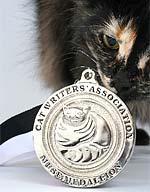 |
|||||||||||||||||||
|
|

We are the proud winners of the 2006 - 2009 winner of the Muse Medallion for Online Magazine by The Cat Writers? Association in their annual Communications Contest! (Photo courtesy of Weems Hutto).
On November 17, 2007 Felinexpress.com was honored to receive The President's Award by the Cat Writers' Association. We are very proud to have earned this distinction and will continue to provide quality information for all cat lovers.
Felinexpress.com Home > Cat Health > Cats and Feline Heartworm Disease |
Cats and Feline Heartworm Disease
The McAdams argued on the way home from the vet’s office. They had started to bicker after the diagnosis came back. Isabella, their beloved Mackerel Tabby had died from heartworm! “How is this possible?” Jenny McAdams asked as she fought back tears. “I always thought that only dogs get heartworm!” Jeff, her husband falls silent. For once, there is nothing to say.
The McAdams are not alone in their thinking. A common misconception for many cat owners and even vets lies in the belief that heartworm doesn’t affect cats or kittens only dogs. Mistakenly diagnosed across the country by veterinarians as; asthma, bronchitis or other respiratory ailments, many veterinarians won’t even consider the possibility that the kitty on the exam table trying to catch his breath has heartworm. The opinion tide is changing however- in 2007 the KNOW Heartworms campaign was launched to raise awareness of this disease both for cat owners and the veterinarians alike.
What is Feline Heartworm Disease?
- Heartworm is a parasite- first discovered in Brazil in 1921.
- Heartworm is caused by the bite of a mosquito infected with this parasite.
- Once entering the cat’s system the parasite burrows down into the soft tissue and undergoes two molts producing immature worms.
- Young worms enter the arteries that flow to the lungs- starting destruction from the very beginning.
- Arteries become inflamed and enlarged as the body tries to protect itself from these invaders.
- Any young worms that die will inflict damage even after their death.
- In six months time, the immature worms will mature. They will live up to 2-3 years.
- Some cats show no signs of Heartworm yet still carry the parasite. Tests for Feline Heartworm are not always accurate.
- Symptomatic or not, untreated when adult worms die, the cat usually dies as well.
What are the Symptoms of Feline Heartworm Disease?
The ABC’s of Symptoms:
- Anorexia
- Blood in sputum
- Blindness
- Collapse
- Convulsions
- Coughing
- Diarrhea
- Difficulty breathing
- Fainting
- Heart murmur
- Lethargy
- Oily coat
- Rapid heart rate
- Sudden death
- Vomiting
- Weight Loss
How is Feline Heartworm Diagnosed?
• Clinical signs (see above)
• Blood tests searching for Antibodies or Antigens- however these results can be inconclusive. The Antigen test only picks up the female worms. It cannot detect the male worms.
• Radiographs showing enlargement of the pulmonary arteries.
• Echocardiograms
• Necropsy
Heartworm Prevention
Prior to being infected, Feline Heartworm Disease is preventable. Heartworm preventatives include:
- Ivermectin-use only under a vet’s guidance.
- Advantage Multi for cats only.
- Heartguard for cats.
- Selamectin
- Milbemycin
- Revolution
- Spraying pesticides outside to prevent the spread of mosquitoes
If you live in a climate that is warm year-round, Heartworm preventatives should be used faithfully. In colder climates when mosquitoes typically die off, consult your veterinarian on how to properly schedule treatment for Heartworm.
Once infected with heartworm (depending on the stage of infection) cats can be treated with steroids. The difficulty comes in managing the inflammation without killing the worms. Dead, the worms cause more havoc that if they are allowed to live. But if left untreated, once the worms reach full maturity and die, the cat will also die. Unlike dogs, in cats it only takes a few worms to wreak internal havoc. For the McAdams, their results were tragic. Had their vet been fully informed about the dangers of Feline Heartworm Disease, Isabella might still be with them today.
More cat breeds |
|
? Copyright 2006-2010 Felinexpress.com, All Rights Reserved
Privacy Statement - Disclaimer - About Me


